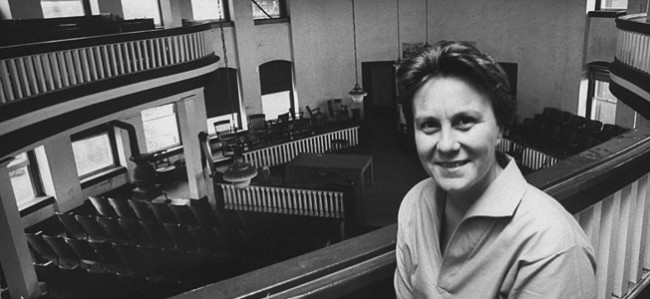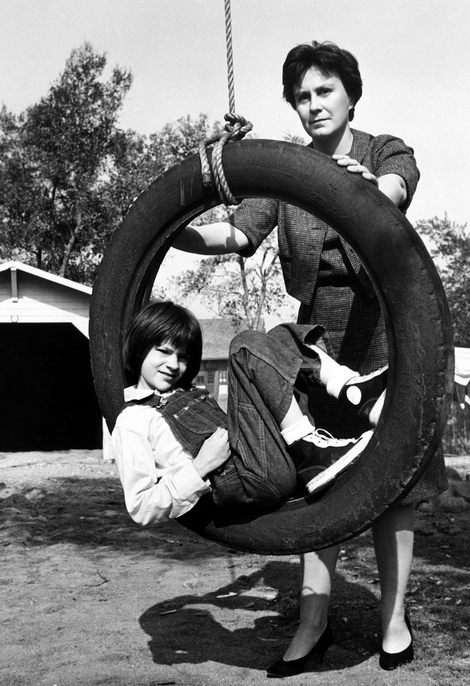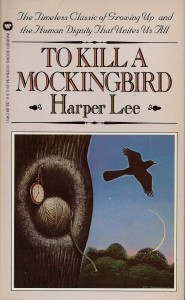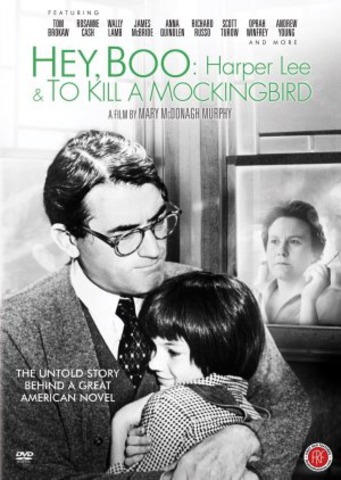
“Masterpieces are masterpieces not because they’re flawless but they tap into something essential to us – at the heart of who we are and how we live.” Boldly taking on the recent backlash against Harper Lee’s Pulitzer Prize-winning classic To Kill A Mockingbird, documentarian Mary Murphy pulls together an expansive selection of interview subjects ranging from Lee’s close personal friends to political leaders to noted tastemaker Oprah Winfrey, who proudly declares Mockingbird was the first book she ever recommended, to a panoply of heralded American novelists (including Anna Quindlen, Wally Lamb and James McBride) to craft a compelling portrait of this self-proclaimed “Jane Austen of the Deep South” while exploring the impact of her groundbreaking debut. Of course there’s a noticeable absence to this impressive lineup of talking heads as the notoriously press-shy Lee hasn’t granted an interview since 1964. Admittedly, this leaves some gaps in Lee’s story, which experts eagerly fill with well-intentioned speculation. Despite this drawback, Murphy delivers a fuller depiction of the process of an American writer by including this wide range of novelists, than the premise alone would suggest. What unfolds is a spirited exploration of the life of Harper Lee and the import of her always-controversial masterpiece.
 Many know that Harper Lee grew up in the Alabama alongside another controversial figure of American literature, Truman Capote. Indeed, Lee has confirmed that a young Capote was the inspiration for Mockingbird’s fey Dill. To that end, because Lee was an admitted tomboy, many felt that Scout was an outright double of the author and by extension much of the novel’s elements must have been pulled right from Lee’s childhood and the streets of Monroeville. While modern novelists argue these claims along with whether or not they matter in the scheme of things, Lee’s biography breezes by lithely laying out her influences and setting the stage for her rebellion. By the time Lee had moved to New York City, she had several published short stories to her name as well as a tribe of friends who rallied behind her talent. Two of these became her patrons, when they offered Lee the chance to take a year off her survival job to pursue her novel ambitions. The result was the roughly hewn first draft of Mockingbird, then titled Atticus. Key figures in the book’s development pop up to detail how this perennial reading assignment took shape. (Even the nagging rumor that Capote was its true author is addressed.) This flows naturally into the book’s rise in popularity, which led to the movie and its rise, which hit theaters during the dog days of the Civil Rights Movement. All this resulted in a humble white woman from the Deep South becoming an unexpected but key figure of the times, as her book boldly spoke out against racism and its influence. Yet as time rolled on, Lee grew tired of having her words twisted by the persistent press. Struggling to write a second novel that she has yet to finish, Lee willfully stepped out of the spotlight, shunning any attempts at interviews. Ultimately, it seems Lee has far more in common with her silent but noble recluse, Boo Radley, than she ever did with the scamp Scout.
Many know that Harper Lee grew up in the Alabama alongside another controversial figure of American literature, Truman Capote. Indeed, Lee has confirmed that a young Capote was the inspiration for Mockingbird’s fey Dill. To that end, because Lee was an admitted tomboy, many felt that Scout was an outright double of the author and by extension much of the novel’s elements must have been pulled right from Lee’s childhood and the streets of Monroeville. While modern novelists argue these claims along with whether or not they matter in the scheme of things, Lee’s biography breezes by lithely laying out her influences and setting the stage for her rebellion. By the time Lee had moved to New York City, she had several published short stories to her name as well as a tribe of friends who rallied behind her talent. Two of these became her patrons, when they offered Lee the chance to take a year off her survival job to pursue her novel ambitions. The result was the roughly hewn first draft of Mockingbird, then titled Atticus. Key figures in the book’s development pop up to detail how this perennial reading assignment took shape. (Even the nagging rumor that Capote was its true author is addressed.) This flows naturally into the book’s rise in popularity, which led to the movie and its rise, which hit theaters during the dog days of the Civil Rights Movement. All this resulted in a humble white woman from the Deep South becoming an unexpected but key figure of the times, as her book boldly spoke out against racism and its influence. Yet as time rolled on, Lee grew tired of having her words twisted by the persistent press. Struggling to write a second novel that she has yet to finish, Lee willfully stepped out of the spotlight, shunning any attempts at interviews. Ultimately, it seems Lee has far more in common with her silent but noble recluse, Boo Radley, than she ever did with the scamp Scout.
 Fittingly Hey Boo is a revelation that – likes its source material – feels sweet but contains a soul-rattling message. In an age where many declare we live in a post-racial society, Murphy takes us into classrooms where young students of all races speak about the book’s themes and struggle to imagine a time where racists nonchalantly threw about the n-word. But Murphy injects her documentary with harrowing stock footage of the darkest days of the battle for civil rights, thereby reminding us of a time many willfully forget. By juxtaposing these shocking images with modern signs of prejudice, Murphy subtly posits that like the townspeople of Lee’s novel, much of our modern society is silently accepting prejudice, rather than questioning it like brave Scout or outright rebuking it like noble Atticus. Meaning for all the editorials written that decry Lee and her contribution to American literature, Mockingbird proves to be an enduring classic precisely because it captures a well-crafted world and daring heroine who defies what the world impresses on her is normal in favor of what she knows to be right. It’s a story that is sadly likely never to grow stale as each new era births a prejudice that is somehow socially acceptable. Yes, like To Kill A Mockingbird, Hey Boo presents an ending that’s poignant and bittersweet, making it a fitting tribute to its elusive inspiration.
Fittingly Hey Boo is a revelation that – likes its source material – feels sweet but contains a soul-rattling message. In an age where many declare we live in a post-racial society, Murphy takes us into classrooms where young students of all races speak about the book’s themes and struggle to imagine a time where racists nonchalantly threw about the n-word. But Murphy injects her documentary with harrowing stock footage of the darkest days of the battle for civil rights, thereby reminding us of a time many willfully forget. By juxtaposing these shocking images with modern signs of prejudice, Murphy subtly posits that like the townspeople of Lee’s novel, much of our modern society is silently accepting prejudice, rather than questioning it like brave Scout or outright rebuking it like noble Atticus. Meaning for all the editorials written that decry Lee and her contribution to American literature, Mockingbird proves to be an enduring classic precisely because it captures a well-crafted world and daring heroine who defies what the world impresses on her is normal in favor of what she knows to be right. It’s a story that is sadly likely never to grow stale as each new era births a prejudice that is somehow socially acceptable. Yes, like To Kill A Mockingbird, Hey Boo presents an ending that’s poignant and bittersweet, making it a fitting tribute to its elusive inspiration.
Hey Boo opens in in limited release May 13th.


